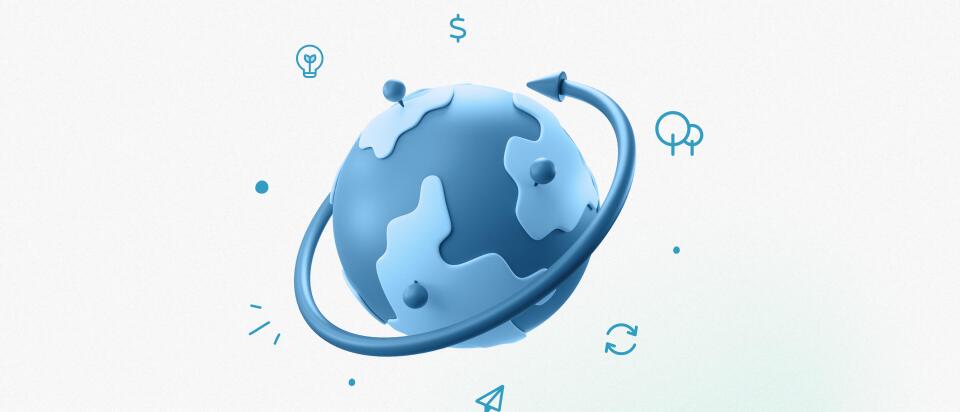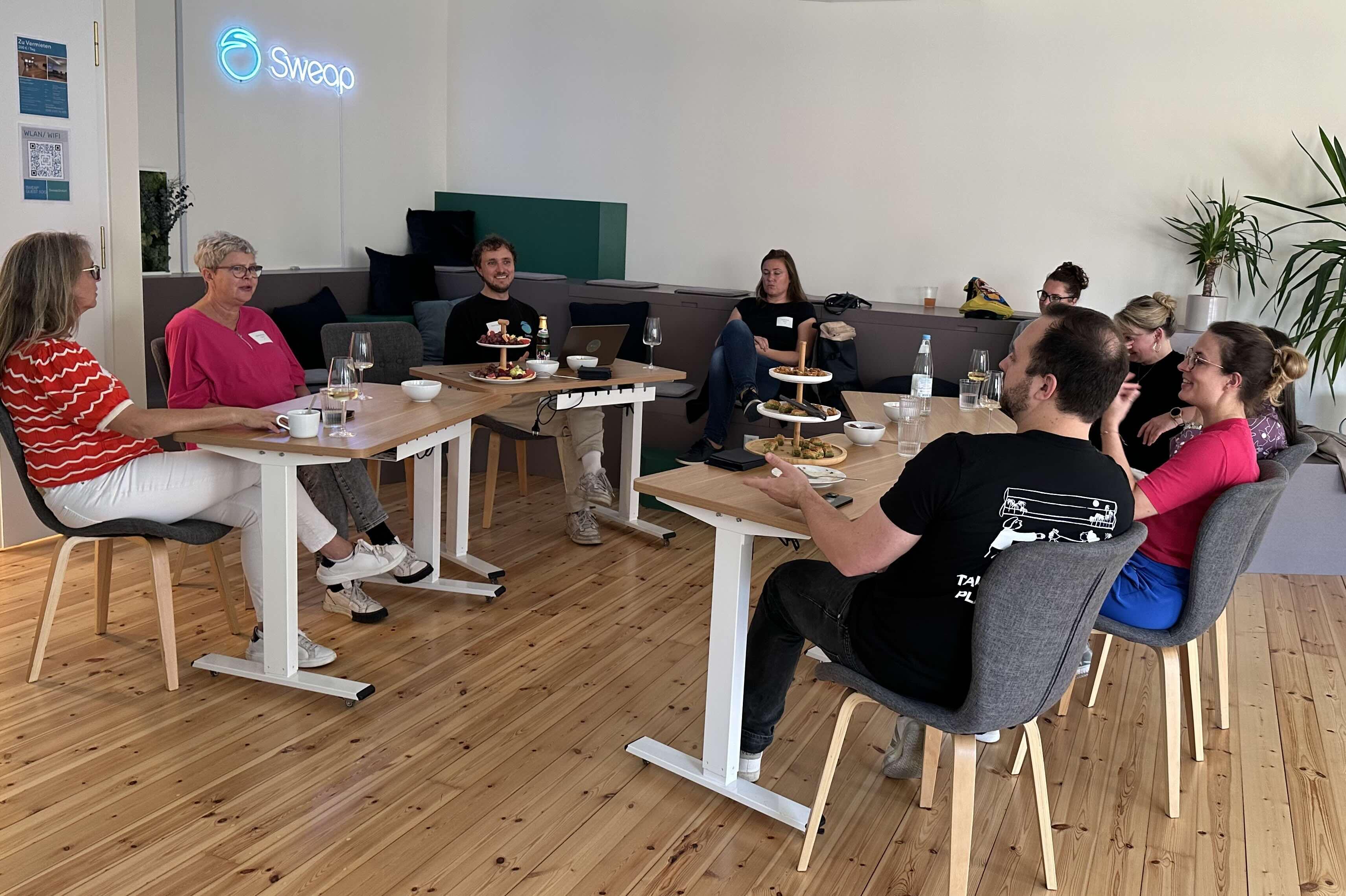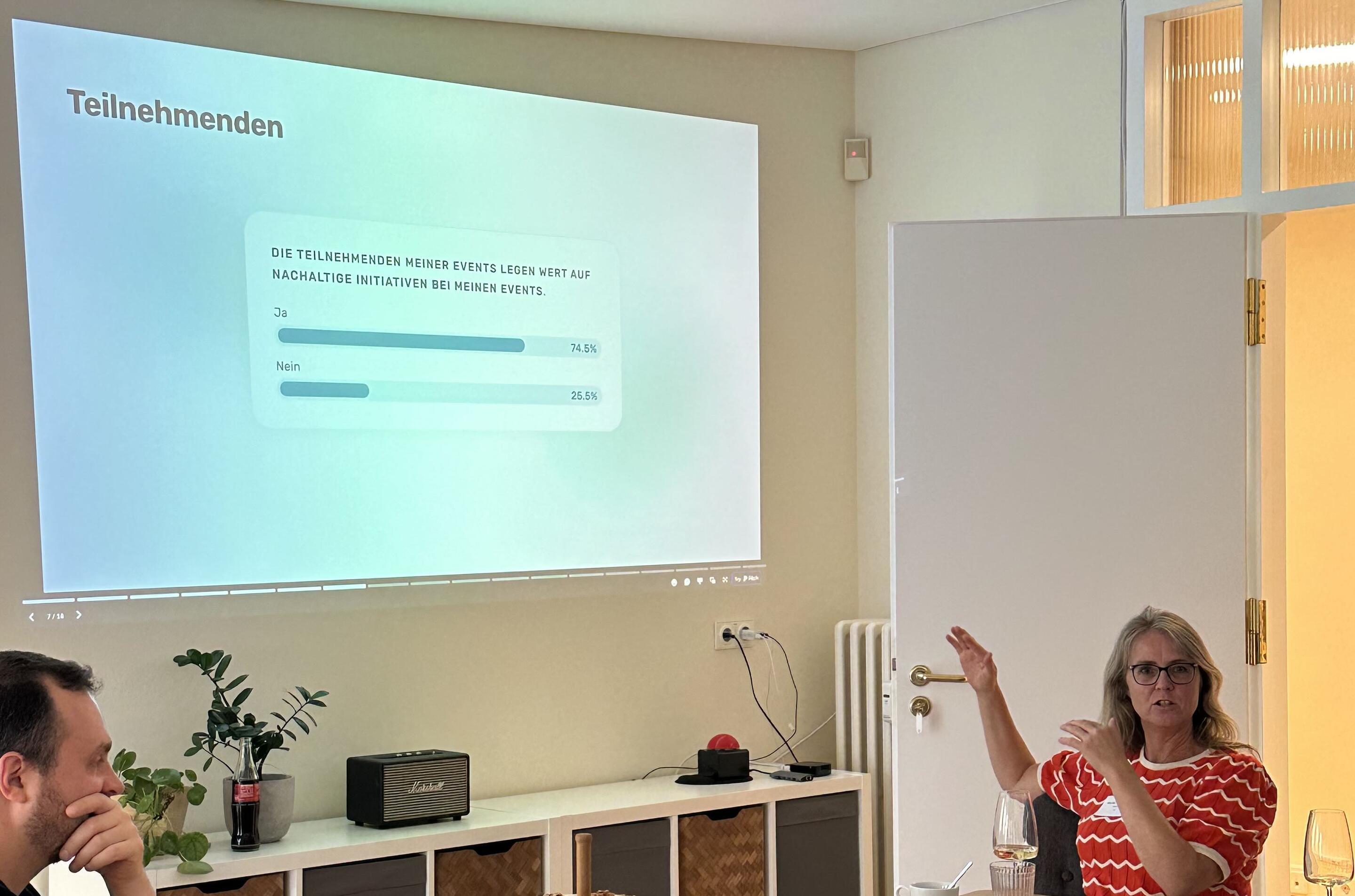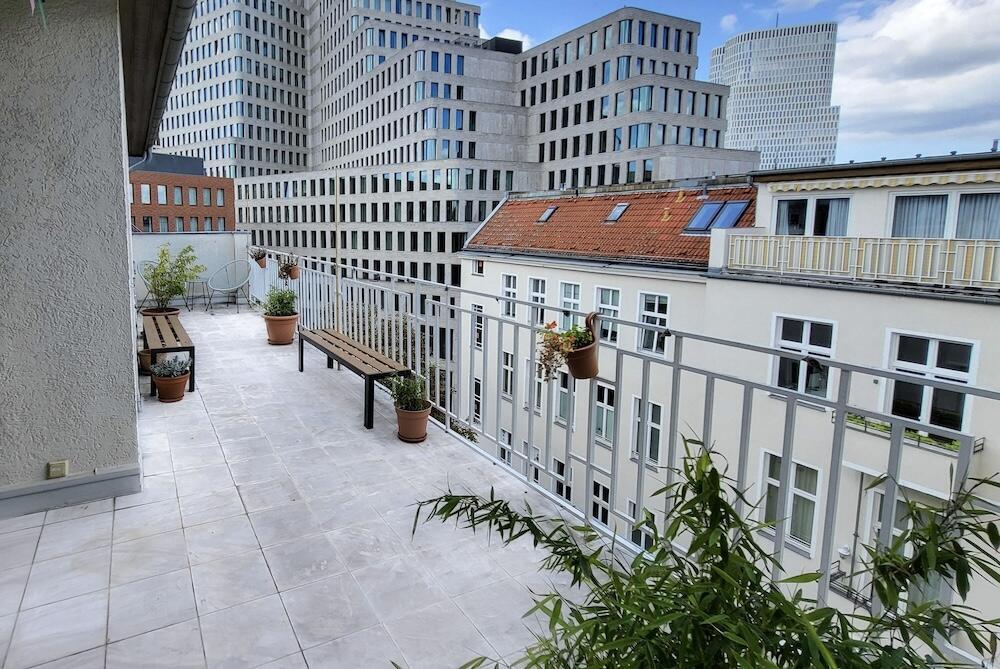
As event planners, we have a great responsibility - towards the environment, society and the participants of our events. The decisions we make in the planning process have a direct impact on resources, energy consumption and the people we reach.
But how do we manage to organise sustainable events without blowing budgets or compromising on the participant experience? We addressed these and other questions at the ‘KlimaKlatsch for sustainable event management’ - an event that offered practical solutions and space for open dialogue.

Sustainability was the hot topic in a relaxed atmosphere for over two hours
Event Sustainability as a Key Issue of Our Time
Sustainability is no longer a trend – it is a necessity. However, the switch to environmentally friendly and resource-efficient processes presents the event industry with enormous challenges.
Whether it's choosing the venue, using sustainable technology or environmentally friendly catering, there is potential everywhere. However, many event professionals struggle with tight budgets, limited team capacities and the often difficult availability of sustainable service providers, especially outside urban areas. Despite these obstacles, it remains our task to find innovative and feasible solutions.
The “KlimaKlatsch": A Space for Exchange
The "KlimaKlatsch" (which translates to climate chit-chat), hosted by "Event-Held:innen" (which translates to Event Heros), was a space for open and honest exchange. Our goal was to create a relaxed but productive atmosphere where local event professionals could discuss this relevant topic.
Instead of pure theory, the focus was on highlighting the real challenges faced by participants – from tight budgets to limited sustainable resources and service providers.
The Key Takeways at the "KlimaKlatsch"
In the following, we summarise some of the most important findings that were identified in the exchange between the participants.
High no-show rates as the biggest challenge for event sustainability
The big topic that afternoon was the no-show rate at events. This not only represents an organisational challenge, but also has a direct impact on the sustainability of an event. When participants cancel at short notice or simply do not show up, it not only leads to the unnecessary consumption of resources – especially in catering – but also affects people who would have liked to attend because the space was blocked by someone who ultimately did not show up. The consequences range from unnecessary consumption of resources to lost opportunities for potential guests.
Solution 1: Analyse user behaviour
One of the proposed solutions was to systematically analyse user behaviour. A/B testing can be used to determine which communication times and content work best to motivate participants to arrive on time.
What are the ideal times to send invitations? Which topics and messages can be used to increase the commitment of guests? How long before an event should invitations, reminders, etc. be sent to achieve the highest commitment?
It is also important to have a realistic estimate of the no-show rate across multiple events. If you are able to analyse the average no-show rate per event format or type, for example through event insights in the event management software, you can plan resources better.
Solution 2: Raise awareness among participants
Another approach is to raise awareness among participants before, during and after the event. The idea of sending personal messages to guests to make them aware of the impact no-shows have on the event was discussed here. Emails such as ‘It's a shame you couldn't be here’ can be used for no-shows to gently point out the resources that were wasted due to the no-show.
The introduction of a no-show fee for free events was also put forward as an option, although the question on how this could be efficiently implemented was raised and did not find any answers.

Inspiring discussions about the results of our current study on event sustainability
Solution 3: Improve event communication
A third approach was to improve event communication. Confirmation emails with the option of generating calendar entries for participants can help to ensure that participants do not forget the event. In addition, a ‘waiting list print’ can make it clear that a cancellation also gives other guests the opportunity to attend the event.
Further Key Takeaways at "KlimaKlatsch"
The discussion on no-shows was just one of many interesting aspects. We would like to add some more here:
Communication of efforts towards greater sustainability
Communication about event sustainability itself was also questioned. The topic is often formulated in too abstract ways and simply thought of as too big, with a ‘we want to save the world’ approach.
It would be much more tangible to talk about specific local measures: cooperations with regional partners, promoting healthy eating by offering vegetarian meals, and making conscious use of resources. This kind of communication does not only prove of a more authentic lingo and approach, but also raises awarenes within a broader audience.
Tools for measuring the carbon footprint
Ein weiteres Problem ist der Zugang zu Tools zur Messung des CO2-Fußabdrucks von Events. Viele Veranstalter*innen würden gerne ihren Umwelteinfluss genauer verfolgen, doch die verfügbaren Tools sind entweder zu teuer oder zu komplex in der Anwendung. Die meisten beschränken sich daher auf die Messung der Anfahrtswege der Gäste.
Ein Vorschlag war, hier Checklisten zu nutzen, um den Prozess zu vereinfachen und dennoch so nahe wie möglich an realistische Werte heranzukommen.
Another problem is access to tools for measuring the carbon footprint of events. Many organisers would like to keep a closer eye on their environmental impact, but the available tools are either too expensive or too complex to use. Most therefore limit themselves to measuring the travel distances of guests.
One suggestion was to use checklists to simplify the process while still getting as close as possible to realistic values.
Certification as an incentive for improvement
Certifications were also a hot topic. These are often associated with high costs and a great deal of effort, but they do offer valuable guidance. The "Blauer Engel” (Blue Angel) certificate, which will also offer certification for events from 2025, was mentioned as an example.
Such environmental labels not only give organisers a seal of quality, but also tangible criteria that they can use to guide them in making their events sustainable.

Participants were welcome to spend the breaks on our beautiful terrace
Event Management Software: The first step towards sustainable events
In recent years, the event industry has increasingly focused on sustainability and started to make its processes more environmentally friendly. However, the transition to sustainable event management requires not only a change in thinking, but also new technological solutions.
Event management software like Sweap can make a decisive contribution here. By digitizing many processes, such as invitation management and the collection of participant data, not only can resources be saved, but (paper) waste and energy consumption can also be reduced. This not only helps the environment but also reduces costs.
A Successful Discussion
The ‘KlimaKlatsch for sustainable event management’ showed that the industry is ready to take on the challenges of event sustainability. The discussions, ideas, and solutions that emerged at this event will stay with us – and hopefully help us on our way to a sustainable event future.
Would you like to attend the next Event Heroes event in Berlin? Then sign up for the waiting list here, and we will keep you informed about future events.
